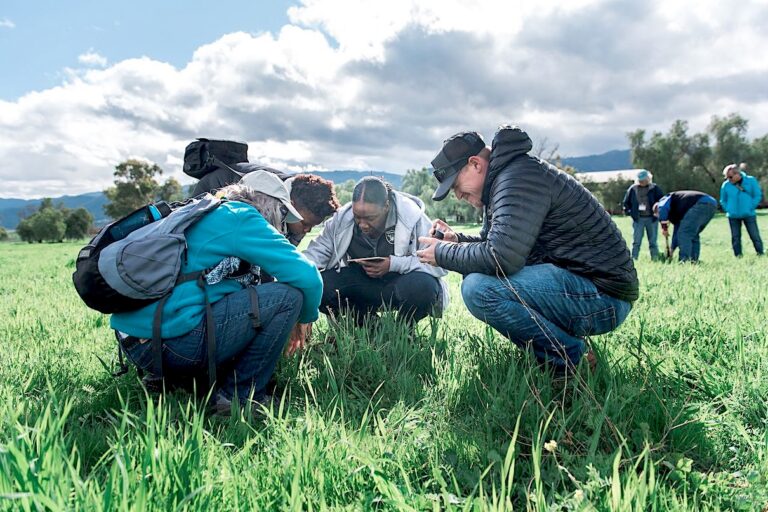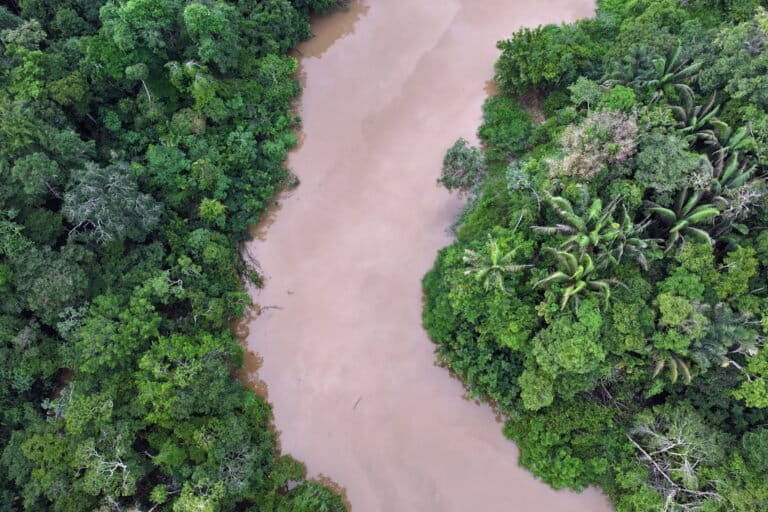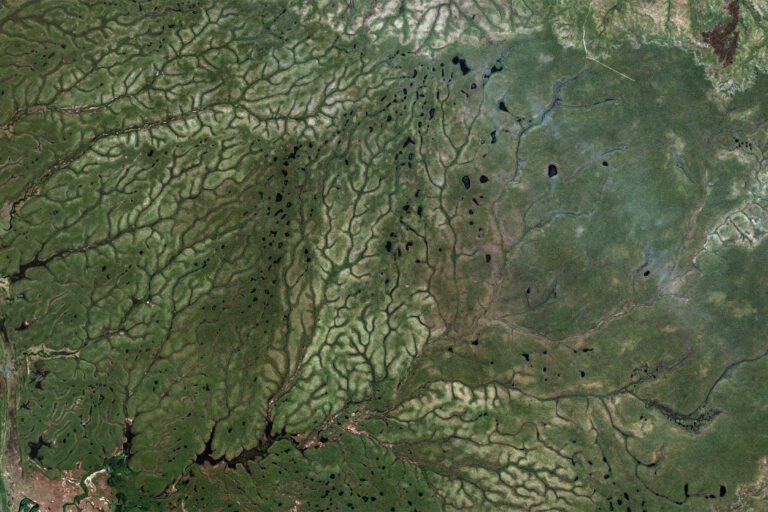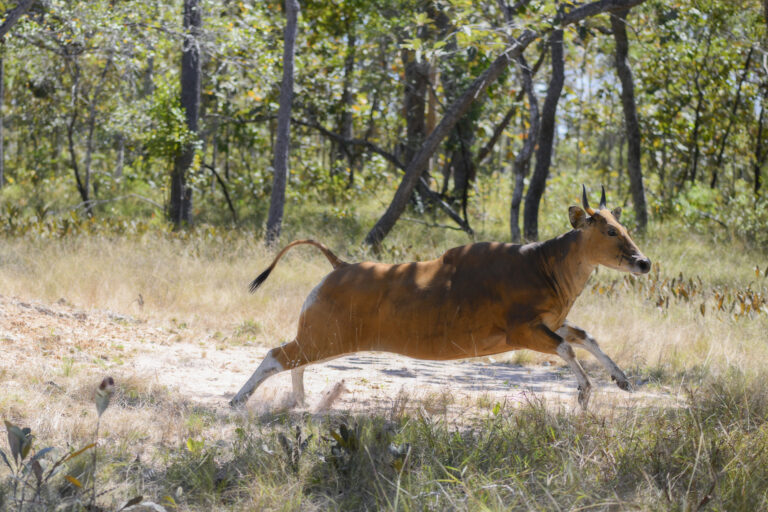- Nigeria’s Doyinsola Ogunye is known across Africa for her work to help children and women build more sustainable futures; the environmental advocate founded the Mental and Environmental Development Initiative for Children (MEDIC) as well as the Recycling Scheme for Women and Youth Empowerment (RESWAYE).
- She says partnerships with corporations and the ability to scale are important in helping the initiatives grow.
- Many of her initiatives center on activities with children and schools — from cleaning up beaches to planting trees — and now, many of the children she initially worked with have entered university and they have carried their experiences into adult life.
- Doyinsola Ogunye recently talked with Mongabay about her work in the face of some of the biggest environmental challenges in Lagos.
Driven to protect the planet one child, one tree and one recycled piece of plastic at a time, environmental advocate Doyinsola Ogunye is helping children, youth and women in Nigeria to create a more sustainable future for themselves. Ogunye founded the Mental and Environmental Development Initiative for Children (MEDIC), through which she also established a Kids Clean Club, Kids Beach Garden and Sea Turtle Sanctuary, and other activities to teach children eco-friendly habits such as cleaning up beaches, planting trees and recycling. She also founded the Recycling Scheme for Women and Youth Empowerment (RESWAYE), an initiative to empower youth and women to protect the environment through recycling and waste management.
As she navigates her daily work, Ogunye says she is guided by the same question that came to her when she first found herself in a new environment she didn’t like: What can I do?
Over the years, she has found some answers — and has even been rewarded for them. Across Africa, she is recognized as an environmental advocate pulling resources to better the planet. In 2020, she won the Her Network Woman of the Year award. She is an alumnus of the Social Innovators Programme (SIP) and a goalkeeper at the Gates Foundation for U.N. Sustainable Development Goals.

Doyinsola Ogunye recently spoke with Mongabay by phone to discuss her initiatives. The following interview has been lightly edited for length and clarity.
Mongabay: Who is Doyinsola Ogunye?
Doyinsola Ogunye: I’m from Ondo state [southwest Nigeria], but I’ve lived in Lagos [Nigeria’s commercial capital] all my life. I’m a non-practising lawyer. I’m passionate about the environment, especially the oceans. I love to be by the ocean. I love plant and animal life. I love children, which is why I do a lot of things around them, especially because they are in their formative years. It’s a good time to get them to change their behavior and do better for the environment and the nation. I love good food. I used to love to dance a lot.
Mongabay: How did a lawyer veer into the environmental space?
Doyinsola Ogunye: It started in my first or second year in university. We moved from one part of Lagos to another, and that exposed me to a lot of environmental degradation, which, growing up, I wasn’t used to, and it ignited a spark to do something. At that time, and even now, many people just complained about Nigeria and how things were going bad, but not many were actively doing something to better what they complained about. So I decided to take that step. I thought if we could start with the children, teach and show them why we should care about the environment, Nigeria would be better for it.
Mongabay: Was it something about your childhood that influenced your awareness of protecting the environment and subsequent desire to give children that same awareness?
Doyinsola Ogunye: I grew up in what you would call Old Ikoyi [an affluent area in Lagos state], and my childhood was shaped by hanging out in nature. I grew up with animals. We had lots of trees, which I always climbed. There was lots of bicycle riding, so when we moved to a new environment, which looked the complete opposite, I wasn’t comfortable. I didn’t like the environment and I knew I had to do something. That was what sprung me into action. You know — what can I do? It was something that bothered me and still bothers me now. What can I do?

Mongabay: Let’s dive into your activities under MEDIC. There is the Kids Clean Club, the Kids Beach Garden and the RESWAYE recycling initiative. Tell us about the early days.
Doyinsola Ogunye: I started with the Kids Clean Club in 2009 and the Kids Beach Garden between 2015 and 2016. And then there was the sea turtle sanctuary, which came up much later, and the tire playground, which was my NYSC [National Youth Service Corps] project. In the early days, a lot of people were ignorant about what we now know. This was 2009, 2010. It was very strange to a lot of people, what I was doing, so they didn’t believe that it was a thing or that climate change was real. They didn’t believe that floods could affect us the way they do now. Fast-forward to 2019 until now — some of the challenges are still there. A decade later, these challenges remain.
Mongabay: How did you manage to put together your team with the skepticism you met while starting?
Doyinsola Ogunye: When I started in 2009, it was with family and friends who supported my vision and younger people with similar interests. At the time, we just knew that we wanted to make a difference. We knew that cleaning the environment would make a difference, planting a tree, cleaning the beach would make a difference, and we were ready to tell the world what we were doing. Now, it’s developed into the circular economy space, and I’m happy about that. However, one thing I want to see more of is people that are extremely passionate about it. Fine, there’s money to be made as in any other sector, but we want to see where people and planets come before profits.
Mongabay: About profits, what are your sustainability models for all the initiatives being run at MEDIC? How have you been able to keep them afloat over the years?
Doyinsola Ogunye: Partnerships. Partnerships, and the ability to scale. I always say that everything you put in the ground deserves to grow. So if you put a seed in the ground, you want to know that the seed will grow into a tree with branches and expand. That’s the general law of growth.
We have a partnership with expatriate wives of the Chevron Group for one of our initiatives, “Free Food Friday.” Every Friday since 2020, they’ve supported the children at MEDIC with food. The children come with reusable plates and spoons, and that way, we reduce the amount of disposable plates and Styrofoam they would’ve used and also teach them to reuse their plates. We also encourage them to bring recyclables from their homes as they come for their food on Fridays. We’ve been instilling that behavioral change in these children from the age of 3, and we’ve been at it for four years now.
We’ve also partnered with Coca-Cola, TotalEnergies, and DHL. Every year, they organize and sponsor beach cleanups, and we use the funding to get cleaning materials and evacuate the waste. That way, we also create jobs for young people who help evacuate the waste. We’ve also created clubs for kids. In the Kids Beach Garden, for example, we have the Tree Adoption Programme, through which people adopt trees. We use income from this to create jobs by getting people to care for the adopted trees. We want to build it across Lagos, across Nigeria, so that children can come to learn via excursions, care for trees, clean the beach and have fun while at it. We’ve also received grant funding. Then, there’s the RESWAYE Recycling Village, where we create beautiful things from waste and sell them. We’re into composting as well. We have a community garden where we sell the proceeds of things that would have contributed to the landfill. We are collecting organic waste and using it to make compost for sale.

Mongabay: In your 2019 conversation with Mongabay, you said when you first started doing beach cleanups with the kids, you would find more bottle caps than seashells on the shorelines. Tell us a little about that experience.
Doyinsola Ogunye: I grew up going to Bar Beach [Lagos state], and we used to pick lots of seashells and conch shells. It was a lovely experience, but these days, when you take children to the beach, you hardly see the shells. And that is a problem even for biodiversity. It means that animals are not [around] as much as they were.
Mongabay: Disappearing aquatic life was a fundamental argument against the Nigerian government’s decision to sand-fill beaches for the construction of the Lagos-Calabar coastal road. You are aware the Nigerian government is set to build a coastal road that cuts through coastal communities and beaches in Lagos state, yes?
Doyinsola Ogunye: Yes, I am.
Mongabay: Oniru Beach, for instance, was said to be a habitat for sea turtles and it is getting sand-filled too. What do you think of the project, and what do policies like that mean for establishments like the Kids Beach Garden?
I believe very firmly that the coastal road is another buffer to let the ocean stand a little bit because the government will always protect the interest of that road. And that’s the whole essence of Eko Atlantic. Some of these things were probably not executed properly as regards [to] educating and sensitizing people about their importance, but if it’s not done, the oceans would come very close. I have pictures and videos of the ocean encroaching on the Kids Beach Garden. Especially in June/July, the ocean gets to the reception [area] of the garden. We’ve lost sheds and lots of trees to the ocean. Last year was horrible, and it’s happening again because of the incessant rainfalls and flooding. If we don’t do anything, especially on our coastal lines, it will get worse, and that’s the angle I view it from.
Mongabay: Back to bottle caps on shorelines — is this still your experience or have things changed over time?
Doyinsola Ogunye: We don’t see as many bottle caps and bottles on our shorelines as we used to. What we see now is lots of Styrofoam. There’s a growing recycling economy in Lagos, and more people are aware of the value of bottles, so there aren’t as many, but the Styrofoams and other types of plastics that have become microplastics are so much on our shorelines. Right now, we’re not even picking the bottle caps because we don’t see them as much — just millions and millions of microplastics on our shorelines.


Mongabay: Are there any stories you can share with us about the noticeable behavioral changes you see in the kids at the Kids Clean Club?
Doyinsola Ogunye: Success to us is when a child begins to champion their causes; having young children come to the beach and start their mini-projects. When the children not just change their behavior but influence other children their age and even younger to start changing their behaviors, that’s success to us, and we’ve seen that. Some children do one project: they plant a tree, and the next thing, they bring family members to do the same; or they organize beach cleanups with their friends in school. That’s the kind of progress we see, that exponential growth. We have children who have written to their estates for us to bring receptacles to evacuate the waste from their neighborhoods, so it’s quite an amazing experience to see these young children that we’ve planted seeds in, [building] from what we have taught them over time.
Mongabay: Are there data on the kids that are part of the program? Do they have to register or is the Kids Beach Garden free to walk in?
Doyinsola Ogunye: Yes. So they register, and we have their details.
Mongabay: How many kids are currently signed up with the Kids Clean Club?
Doyinsola Ogunye: Right now, we work with schools. We have a hundred schools, and we are also expanding because we are working now in public schools — primary, junior secondary and senior secondary schools. We are creating clubs in the schools, getting the children involved in tree planting and not just planting but protecting the trees.
Mongabay: How does that work? Protecting the trees?
Doyinsola Ogunye: There’s one school where we have planted about a hundred trees. In there, we’ve had instances where children who play football take out the tire guards that we use to protect the trees and use them as goalposts. We have our children in the schools advocating for that to stop. We also have younger children who will pull out the leaves of the trees, and we have these children who will speak up during the assembly to say, ‘Leave the trees. Protect the trees so that the trees can protect us.’ Even when it comes to waste management, the children are telling their peers to use the receptacles in schools. What we’ve seen is that some children have taken that message home. They bring their recyclable household waste to recycle in school.
Mongabay: What’s your model for retaining kids in the program? You’ve expanded over the years, working with 100 schools and looking to grow more. Have you had the same kids as when you started up until now, or do you have new kids every year or every couple of months?
Doyinsola Ogunye: You just made me realize that some of the children we started with in 2009 are now in universities. We keep in touch with them. They also come back to volunteer. Some of them have started businesses of their own and [are] looking for how to grow and support the initiatives. And because we now work with schools, every year we have new students join us. When old students graduate, new students come in, and that’s how we keep children in the program.

Mongabay: What is it like to be a child today, given the climate and environmental crisis that are the future for young people?
Doyinsola Ogunye: I thank God I didn’t have the childhood many children today have. Most children are locked indoors in concrete jungles, especially in Lagos. Once, some children visited the beach, and we had animals around. That was the first time one of them saw a goat. The child was about 6 years old. A few others came to the beach. They had never seen crabs before and were scared. Some children are scared of sand touching their feet. There are many like that who are not in touch with nature compared to their counterparts in America, for instance, who go camping and hiking. These things help in cognitive development, especially in their formative years. I know children in Nigeria who have never seen the ocean.
There’s a lot of work to do but I’m happy that some schools have started to add in their curriculum to take the children out to see the ocean and understand the role they have to play because the children of this generation will have a lot more work to do than previous generations, due to global warming and climate change and ocean pollution. So, I encourage every parent to start to encourage the children as early as possible to understand that they have a huge role to play if they are going to survive this planet. A few months ago, the heat waves were terrible, and many people didn’t understand it. We are experiencing incessant rainfalls, and when the sun is out, it’s too hot. The climate is changing, and how we adapt to it is also changing. We need to do more and take audacious steps. This is the time to start putting millions and billions of seeds in the ground if we are going to win this fight for our planet.
Mongabay: You talked about how some kids have never seen the beach or the ocean before, even in Lagos, which is a coastal city. I understand that many beaches in Lagos state require access fees, and that’s not something everyone can afford. Do you see a way where the government and other institutions can help to make beaches more accessible?
Doyinsola Ogunye: There are still a lot of free beaches, but most of them are further down the city. They are owned and managed by the communities. So, for example, if you have a good relationship with the community leaders and you support them, and they support you as well — supporting can be as little as organizing a beach cleanup monthly and encouraging people to go there, to open up the place for eco-tourism and development. I think that’s one way the government can do that. School excursions can also help, but there would have to be a lot of security protocols in place here because it involves children.

Mongabay: Are there any specific stories from your interaction with children that paint a broader picture of Nigerian life and the environment?
Doyinsola Ogunye: My organization interacts with children from all walks of life. We work with children from the communities as well as those from gated estates and private schools, and we see that there has to be a blend between the children so they can learn from each other. Currently, we are organizing a beach cleanup with the children from a private school and the children from the community to get them to learn from each other. The kids from the community are very talented when it comes to using their hands and creating things while the children in these schools are very knowledgeable about the ocean and things like that but lack practical knowledge. I’m hoping that activities like this will help bridge the gap.
Mongabay: What future do you see for the children you work with, who now understand the environment better and contribute to its sustainability?
Doyinsola Ogunye: I see a cleaner and greener future for them. I see a future where they are active and profering solutions and even more innovations than we have, thanks to technology and funding now made available in this sector.
Banner image: Two schoolboys planting a tree. Image courtesy of Doyinsola Ogunye.














